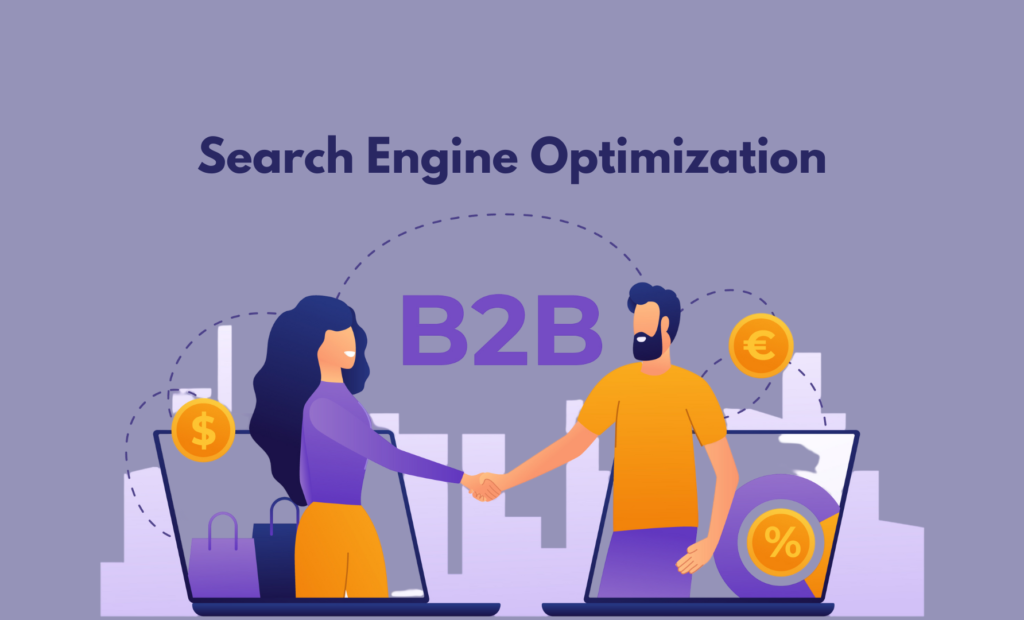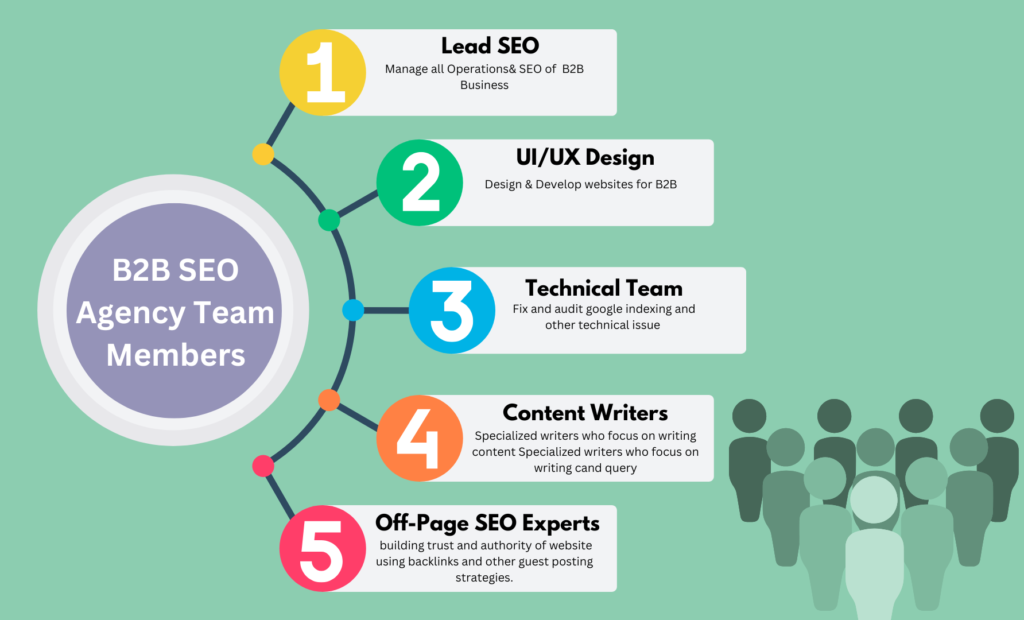
SEO Agency for B2B
ToggleIntroduction
In business-to-business (B2B) sales, it’s important to build strong connections with people who make decisions because selling products in this process usually takes a long time.
Using SEO, or search engine optimization, is also very important as it helps more people find your company online by using the right words and creating content that’s just right for your business.
What Is B2B Business?
B2B refers to business interactions between two companies rather than between a company and individual consumers. In other words, B2B companies sell products or services to other businesses. Here are some key points about B2B business:
Target Audience:
B2B companies focus on decision-makers within other companies. These decision-makers could be CEOs, marketing managers, procurement officers, or IT directors.
Longer Sales Cycles:
Unlike B2C (Business-to-Consumer) sales, where individual consumers make relatively quick purchasing decisions, B2B sales involve longer cycles. Decision-makers spend time researching, evaluating options, and comparing solutions.
Complex Offerings:
B2B products or services are often more complex and tailored to specific business needs. Examples include enterprise software, industrial machinery, consulting services, and office supplies.
Relationship-Driven:
Building strong relationships is crucial in B2B. Trust, reliability, and expertise play a significant role in closing deals.
SEO The Key Currency of B2B
SEO is the key currency of B2B success or failure because of following points.

Visibility and Reach
Imagine you’re a B2B company offering cutting-edge software solutions for supply chain management. Your potential clients are busy professionals who search for solutions online. Here’s where SEO comes in:
To help B2B websites rank higher on search engines like Google and Bing. Unlike B2C (business-to-consumer) SEO, which targets a broad audience, B2B SEO focuses on keywords that key decision-makers within companies search for while at work.
When these decision-makers look for relevant terms related to your business (like “supply chain optimization software”), good B2B SEO ensures that your website appears prominently in their search results. The result? Increased visibility, more potential clients discovering your offerings, and greater brand exposure
Lead Generation
B2B SEO involves two key aspects: keyword optimization and content creation. By strategically using industry-related keywords, you attract decision-makers actively seeking solutions.
SEO-optimized content—such as blog posts or case studies—acts as a lead magnet. Imagine a logistics manager stumbling upon your well-crafted blog post titled “Effective Supply Chain Strategies.” They’ll appreciate the insights and explore your offerings further.
Authority and Trust
Quality content is key for B2B credibility. Regularly publishing high-quality material—such as in-depth supply chain guides or software feature videos—demonstrates expertise. Additionally, backlinks from reputable sites boost your authority. When search engines recognize this, decision-makers are more likely to trust and consider your offerings.
Cost-Effective Marketing
SEO ensures that your website attracts organic traffic—people who discover you through search engines without clicking on paid ads. Unlike paid advertising, which requires ongoing spending, organic traffic flows consistently once your site is optimized.
It’s like having a steady stream of potential clients knocking on your digital door. Additionally, SEO’s long-term benefits keep working for you, even after the initial campaign, as your visibility improves, and potential clients find your offerings.
Competitive Edge
SEO helps you stand out in the B2B crowd. When your website ranks higher than competitors’ for relevant keywords, potential clients notice you first. Regularly updating content and staying aligned with industry trends ensures you stay relevant. It’s like having a spotlight on your business!
Audit Your Current SEO
SEO involves recognizing what’s working well (like ranking high for specific keywords), pinpointing areas for improvement (such as low-traffic pages),and exploring untapped opportunities. To evaluate, check technical aspects (like mobile-friendliness), optimize on-page content (meta tags, relevance), and analyze your backlink profile for authoritative links. It’s like fine-tuning your online presence!
Define Your Buyer Persona:
When targeting B2B clients, understand their pain points—whether it’s supply chain challenges, rising costs, or outdated systems. Know what solutions they seek, prioritize their needs (like real-time tracking or cost savings), and study their search behavior.
Optimize your website and content around relevant keywords, create valuable resources (like e-books or webinars), and showcase success stories. It’s all about tailoring your SEO strategy to meet their specific requirements!
Set Clear Business Objectives:
To effectively integrate SEO within a business strategy, it’s crucial to align it with overarching business goals. This involves setting clear KPIs that reflect SEO’s impact on key business outcomes, such as lead generation, customer acquisition, and ultimately, revenue growth.
By doing so, SEO services becomes a measurable and integral part of the business’s success, driving targeted traffic and contributing to the company’s growth and profitability. This strategic approach ensures that SEO efforts are not just about rankings, but about real business results.
Collaborate with Client-Facing Teams:
To optimize your SEO strategy, it’s crucial to collaborate with client-facing departments like sales and customer support. By analyzing their direct interactions with customers, you can gain valuable insights into customer needs and preferences.
This information is instrumental in refining your SEO tactics, ensuring that your content resonates with your target audience and aligns with their search intent. Such a data-driven approach not only enhances your SEO efforts but also bridges the gap between customer expectations and your online presence.
Conduct Keyword Research:
In the realm of B2B digital marketing, identifying the right keywords is crucial for SEO success. Start by pinpointing keywords that resonate with your offerings, then delve into niche-specific long-tail keywords for a targeted approach.
Prioritize these keywords by balancing search volume, competition, and relevance to your business. Additionally, customer interactions are a goldmine for insights, helping to refine your keyword strategy. This holistic approach ensures your SEO efforts are both focused and expansive, capturing the essence of your market search behavior.
Map Keywords to the Sales Funnel:
To optimize your SEO strategy, it’s crucial to map keywords to the buyer’s journey. For the awareness stage, use broad keywords that address the buyer’s initial interest. As they move to consideration, focus on keywords that relate to comparisons and solutions.
Finally, at the decision stage, target specific, action-oriented keywords that prompt a purchase. Tailoring content to each stage not only boosts visibility at every phase of the journey but also guides potential customers smoothly towards making a decision, enhancing your SEO effectiveness.
Develop a Content Strategy:
When creating content, it’s essential to focus on target keywords to ensure that the material is discoverable by the intended audience. High-quality, informative content that provides real value to readers is key to engaging users and encouraging them to spend more time on your site.
Additionally, optimizing content for search engines through on-page SEO techniques, such as using appropriate meta tags and ensuring mobile-friendliness, can greatly enhance visibility in search results. Striking a balance between user-centric and SEO-friendly content will lead to a successful content strategy.
Optimize Landing Pages for B2B Customers:
Creating a landing page that is both user-friendly and conversion-focused is essential. It should be designed with clear, engaging content and intuitive navigation to ensure a positive user experience. Optimizing meta tags, headings, and content not only helps in improving search engine rankings but also enhances the readability for users.
Implementing schema markup is crucial for generating rich snippets that make your page stand out in search results. Moreover, a well-optimized page addresses the needs of both users and search engines, balancing on-page SEO with compelling content that drives engagement and conversions.
Promote Your Content for Backlinks and Mentions
To effectively increase your online presence, it’s essential to engage with industry influencers, bloggers, and authoritative websites. Encourage them to share and quality backlink to your content, which should provide value to their audience. Utilize social media platforms and networking strategies to broaden your content’s exposure.
Additionally, implement schema markup to enhance your website’s visibility in search results with rich snippets. Finally, ensure your content is optimized for search engines while maintaining readability and value for your audience. This dual focus on on-page SEO and user experience can significantly boost your website’s traffic and engagement.
Review Technical SEO
To enhance your website’s performance, start by evaluating its speed, mobile compatibility, and search engine accessibility. Address any technical problems like broken links or repetitive content promptly. Streamline your website’s layout and user journey for ease of navigation. Connect with notable figures in your industry, bloggers, and relevant online platforms to foster relationships and earn backlinks to your quality content.
Apply schema markup to enrich search results with snippets. Finally, refine your content to cater to both your audience and search engines, ensuring a balance between readability and SEO.
IT Company Accelerated Growth of Ambition for B2B Business:
Accelerating growth in B2B businesses requires a multifaceted approach that aligns with the evolving expectations of digital-first customers. Gartner emphasizes the importance of a low-effort, digital buying experience to drive revenue growth, suggesting that sales leaders must prioritize customer-centric buying experiences that reflect new buying journeys.
McKinsey also highlights the need for B2B sales to adapt by putting the customer at the center of growth strategies, suggesting a shift to hybrid sales models that blend digital and personal interactions.
Furthermore, tactics such as leveraging data analytics, improving operational agility, and fostering a culture of continuous learning can contribute to accelerated growth. It’s essential for B2B businesses to stay ahead of technological advancements and changing market dynamics to maintain a competitive edge and achieve their ambitious growth targets.
B2B SEO Team Hierarchy

B2B SEO agency team members
Choosing the right B2B SEO agency is crucial for enhancing your online presence and driving business growth. Here are some key points to consider:
| Industry experience | IT company is working since 2007 |
| Service offerings | Custom service pages and tailored to customer needs |
| Pricing & Policy | Clear pricing policy with no hidden charges |
| Industry Expert | IT company is industry expert and provides valuable services to customers. |
Conclusion
In the realm of B2B sales, establishing connections with decision-makers is paramount, necessitating strategies like search engine optimization (SEO) to enhance online visibility and engagement.
B2B businesses, catering to other companies, demand a nuanced approach due to longer sales cycles and complex offerings. Effective B2B SEO focuses on targeted keywords, content creation, and fostering authority and trust. It offers cost-effective marketing, a competitive edge, and aligns with broader business objectives.
Collaborating with client-facing teams, conducting thorough keyword research, and mapping keywords to the sales funnel are pivotal. Choosing the right B2B SEO agency is instrumental in achieving accelerated growth and staying competitive in the digital landscape.





